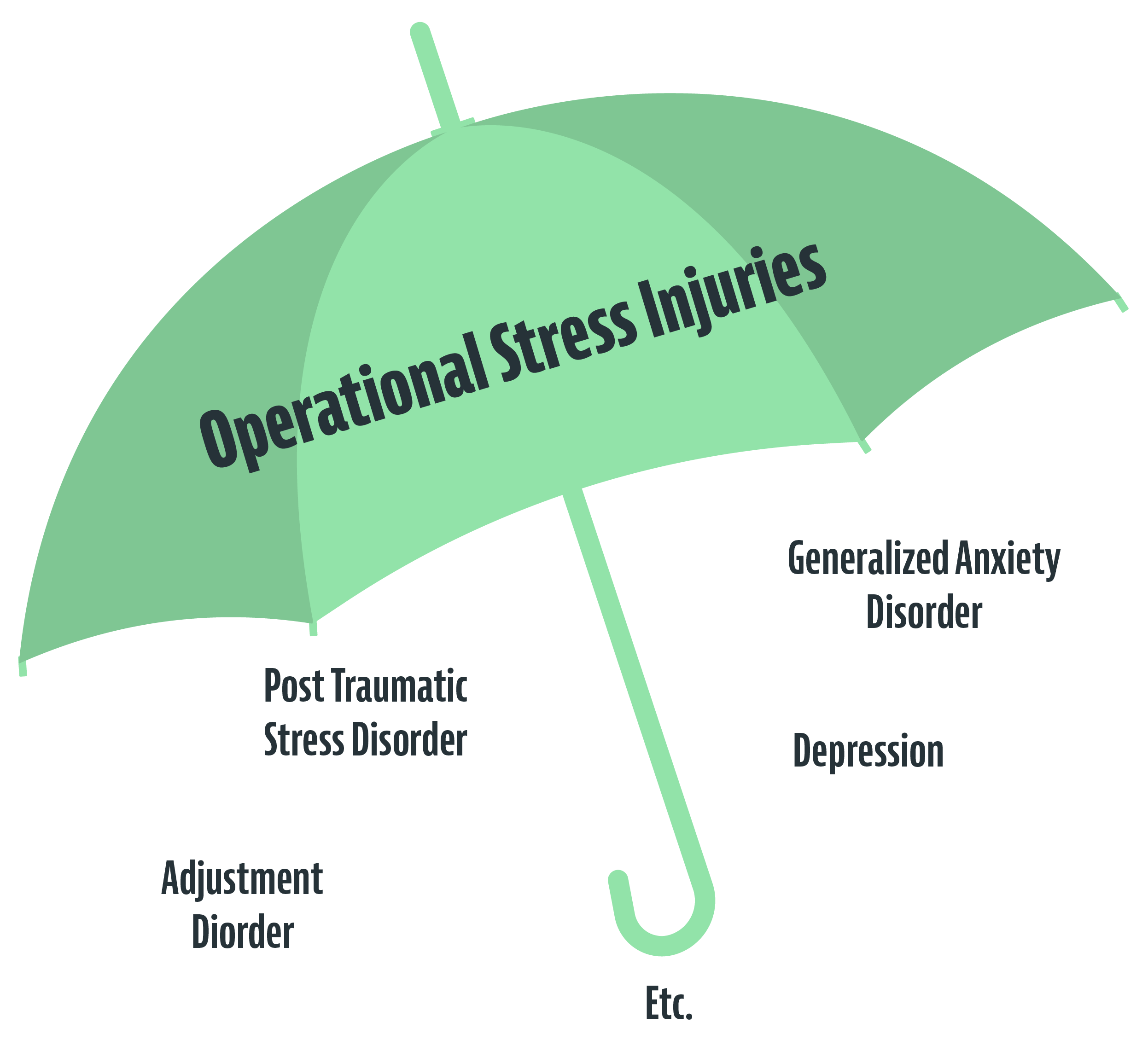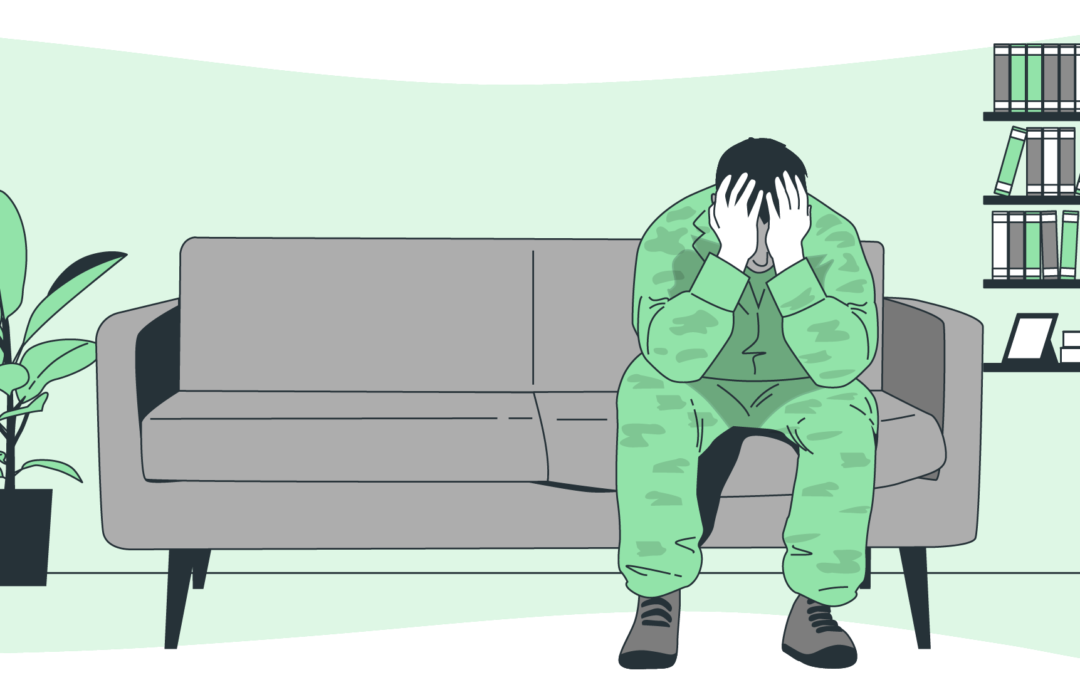PTSD and OSI 1
Post-traumatic stress disorder (PTSD) originates in traumatic events involving death, the threat of death, serious injury or sexual violence. A person who is a victim, direct witness or close relative of the victim of the traumatic event, as well as people who are repeatedly exposed to aversive details of traumatic events, can develop post-traumatic stress disorder (DSM-5). PTSD is the body’s normal reaction to an abnormal situation. The brain tries to process the information but lacks the tools to do so.
In the military community, PTSD is often referred to as “operational stress injury” or “OSI”. But what is OSI and how does it relate to PTSD?
Operational stress injury is a term used to define “any persistent psychological problem arising from the performance of military duties” (OSISS) that can impact the sufferer’s day-to-day functioning.
In other words, it’s an umbrella term for a number of diagnoses or mental health problems that may result from exposure to operational stress during military service, whether on international deployment, domestic deployment or exercise. This operational stress can be caused by a traumatic event, by wear and tear due to accumulated stress, by the bereavement of an important person, or by a moral injury due to the undermining of one’s deepest moral values.
PTSD is not always OSI, and OSI is not always PTSD. Resources
Resources
Did you know that the VMFRC has developed a range of services specifically adapted to the reality of families living with PTSD-type OSIs? Here’s an overview:
- Appointment to assess your needs and refer you to the VMFRC and external resources best suited to your needs.
- Psycho-educational sessions on OSI/PTSD and its impact on the family.
- Individual, marital or family psychosocial follow-up to support and accompany families living with OSI/PTSD in coping with the challenges they face.
- Specialized educational follow-up to help parents living with OSI/PTSD adopt positive parenting practices with their children.
- The E=MC3 “Together to better understand” group: a psycho-educational group that enables children between the ages of 7 and 11 living with a military/veteran parent with an operational stress injury to learn more about OSI/PTSD and its impacts, share their family reality and find mutual support to better understand their reality.
- The OSI group for Teens: a psycho-educational group for teens aged 12 to 17 living with a military/veteran parent with an operational stress injury, to learn more about OSI/PTSD and its impacts, share their family reality and find mutual support to better understand their reality.
- The OSI group for Parents: offered as a complement to the E=MC3 and OSI Teens workshops, to build a common understanding of OSI/PTSD within the family and make the connection with the themes addressed with their children.
- The OSI group for Spouses: a support group for spouses of military/veteran with OSI/PTSD to share and find mutual support to better adapt to their role as caregiver.
PTSD brings with it its share of challenges and a great deal of adaptation, both for the person experiencing it, and for those close to them. The VMFRC can accompany and support you through these many challenges.
Other resources are also available to you. Here are just a few:
- Operational Stress Injury Social Support (OSISS)
OSISS-SSBSO@forces.gc.ca
1-800-883-6094 - VAC Assistance Service:
1-800-268-7708 - Member Assistance Program:
1-800-268-7708 - Health Services Centre in Valcartier Base
418-844-5000 poste 5802 - Veterans Affairs Canada
1-866-522-2122 - Atlas Institute for Veterans and Families
https://atlasveterans.ca/ - OSI Guide for Family
https://crfmv.com/wp-content/uploads/2022/11/Guide-BSO-EN_web.pdf - Leo and Lily Don’t Understand What Is Wrong With Their Dad!
Book for children : https://crfmv.com/wp-content/uploads/2022/11/histoireEN_2016-1.pdf - Operational Stress Injury (OSI) Resource
http://cfmwsmfs.com/caregiver/story_html5.html - The Mind’s the Matter
- Spouse interactive video: http://cfmwsmfs.com/mtm-en/story_html5.html
- Youth interactive video: https://www.cfmwsmfs.com/mtm-youth/en/index.html
- LifeSpeak
Available through the website or mobile app. Veterans and their families use the username “canada” and the password “canada“. https://veterans.lifespeak.com/
1 References
Operational Stress Injury Social Support (OSISS), (2023). Spotted in : https://cfmws.ca/support-services/health-wellness/mental-health/operational-stress-injury-social-support-(osiss)
American Psychiatric Association, (2015). Manuel diagnostique et statistique des troubles mentaux; Mini DSM-5, Elsevier Masson.
Canadian Institute for Public Safety Research and Treatment (CIPSRT), (2023). Glossary of Terms; Operational Stress Injury (OSI). Spotted in: https://www.cipsrt-icrtsp.ca/en/glossary/operational-stress-injury-osi
